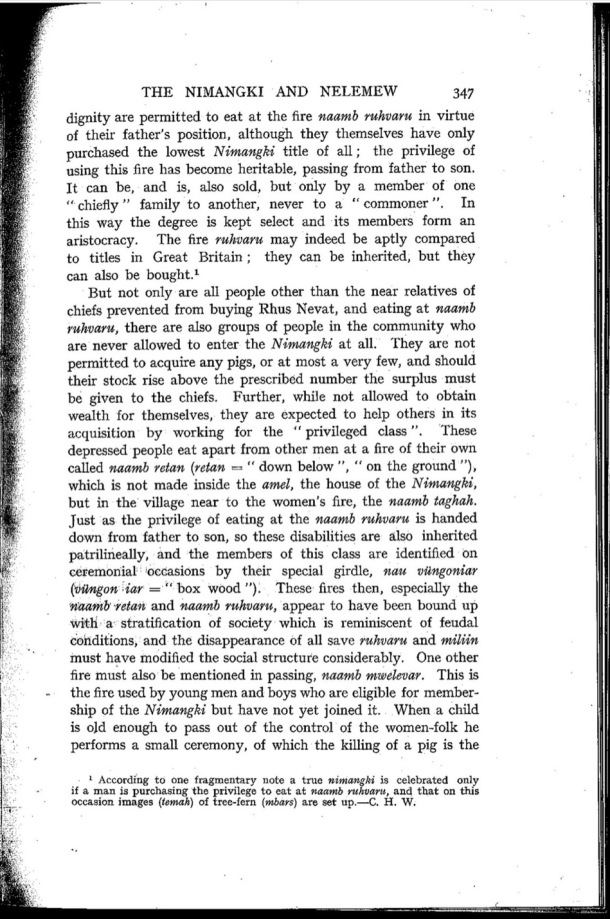|
|  [Note: this transcription was produced by an automatic OCR engine]
1
,4
:
4
J
fl
_‘.
it
535??
v.
, .,
l3
2
1
>
~_‘.
W.
Hi,
‘F
THE NIMANGKI AND NELEMEW 347
dignity are permitted to eat at the ï¬Åre nnamb mhvam in virtue
of their father's position, although they themselves have only
purchased the lowest Nimangki title of all; the privilege of
using this ï¬Åre has become heritable, passing from lather to son.
It can be, and is, also sold, but only by a member of one
“ chiefly" family to another, never to a “ commoner". In
this way the degree is kept select and its members form an
aristocracy. The ï¬Åre ruhvaru may indeed be aptly compared
to titles in Great Britain; they can be inherited, but they
can also be bought.‘
But not only are all people other than the near relatives of
chiefs prevented from buying Rhus Nevat, and eating at naamb
mhvaru, there are also groups oi people in the community who
are never allowed to enter the Nimangki at all. They are not
permitted to acquire any pigs, or at most a very few, and should
their stock rise above the prescribed number the surplus must
be given to the chiefs. Further, while not allowed to obtain
wealth for themselves, they are expected to help others in its
acquisition by working for the "privileged class ". These
depressed people eat apart from other men at a ï¬Åre of their own
called naamb man (mum = " down below ", " on the ground "),
which is not made inside the amel, the house of the Nimangki,
but in the village near to the women's ï¬Åre, the naamb taghah.
just as the privilege of eating at the naamb ruhvavu is handed
down from father to son, so these disabilities are also inherited
patrilineally, and the members of this class are identiï¬Åed on
ceremonial ‘occasions by their special girdle, mm vimgoniar
(oimgun-iar = "box wood "). These ï¬Åres then, especially the
'n'aamb‘-man and naamb mhuam, appear to have been bound up
with a stratification of society which is reminiscent ot feudal
conditions, and the disappearance of all save mhvam and mihin
must have modiï¬Åed the social structure considerably. One other
ï¬Åre must also be mentioned in passing, mzamb mwelevarr This is
the ï¬Åre used by young men and boys who are eligible for member-
ship of the N imangki but have not yet joined it. When a child
is old enough to pass out of the control of the women~folk he
performs a small ceremony, of which the killing of a pig is the
_ - According to 9» fragmentary note a true nimaniki is celebrated only
ii a i1_an is purchasing the pmnlege to eat at mmmb I14 WW4. and that on this
occasion image: (tumult) vi tree-fern (mbars) are Set up.—C, H. W.
,
|